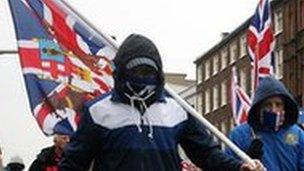Loyalist flag protests 'factor' in £50m economic losses
- Published

Protests over the union flag dispute began on 3 December
Loyalist flag protests were a contributory factor in Belfast shops losing up to £50m, business representatives are expected to reveal.
They are due to meet American diplomat Richard Haass who is trying to broker a deal on issues like flags and parades.
Business groups will say a successful outcome is imperative to securing jobs and improving prosperity.
Figures, seen by the BBC, reveal a "significant decline" in takings by city shops in the year to July 2013.
Revenues fell from £577m to £522m, according to a report for Belfast city centre management.
Many people within loyalist communities were angered by the decision of Belfast City Council on 3 December to restrict the number of days on which the union flag is flown at the city hall.
They took to the streets to protest and some protests resulted in violence with many police officers injured.
Major flags protests took place on Saturdays from December 2012 and into the first months of the year, adding to what were already difficult economic conditions on the high street.
Retail sources claimed the flags demonstrations were partly to blame for revenues falling, but pointed out new traffic measures and the recession also had to be taken into account.
Dr Haass has a number of meetings scheduled with several business organisations on Thursday and Friday.
The Confederation of British Industry, the Institute of Directors and the Pubs of Ulster are just some of the groups which will meet him.
Some union flag protests were marked by illegal road blocks that severely disrupted business and nightlife, leading to a publicly-funded £1m advertising campaign to encourage people into the city to boost trade.
An evaluation of what was known as the 'Backin' Belfast' campaign has been carried out for the Northern Ireland Tourist Board.
It found that 204,000 trips were taken to Belfast by people "who made a positive change to their visiting behaviour as a result of the campaign".
According to the tourist board, the visitors spent £7m, which helped recoup some of the city's retail losses.
"As the protests subsided, and the campaign kicked in, our research shows tourism business recovered quickly," said a spokeswoman.
Meanwhile, visitor numbers to Northern Ireland from the Republic of Ireland held up during the first three months of 2013.
There were 108,000 trips, a 3% increase on the same period in 2012.
However, the amount of money they spent in Northern Ireland fell by 22% to £12m.
No official figures have yet been published on visitor numbers from Great Britain, Europe and the rest of the world.
- Published7 March 2013